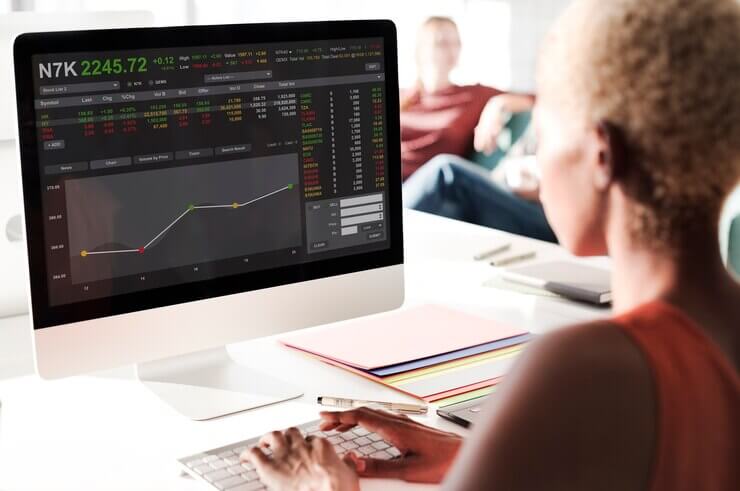In the forex market, the way your trades are executed can significantly influence your overall trading experience and success. No Dealing Desk (NDD) Forex Brokers offer a unique approach by providing direct access to the interbank market without the involvement of a dealing desk.
This type of broker allows for faster trade execution, competitive pricing, and greater transparency, making it an attractive option for traders seeking a more efficient and fair trading environment.
In This Post
No Dealing Desk Forex Brokers
No Dealing Desk (NDD) Forex Brokers are brokers that provide direct access to the interbank market without passing orders through a dealing desk.
Unlike traditional brokers, NDD brokers act as intermediaries by connecting traders directly with liquidity providers such as banks, financial institutions, and other brokers. This setup allows for faster execution speeds and often results in better pricing for traders.
How Do NDD Forex Brokers Work?
NDD brokers utilize advanced technology to route traders’ orders directly to liquidity providers. Here’s a step-by-step breakdown of how they operate:
1. Order Placement
The trading process begins when a trader decides to buy or sell a currency pair. This decision is executed by placing an order through the broker’s trading platform, which is typically a sophisticated software interface that connects the trader to the forex market.
Most brokers provide platforms like MetaTrader, cTrader, or proprietary platforms, designed to be user-friendly and equipped with a range of tools such as charting software, technical indicators, and risk management features.
Traders can place various types of orders, including market orders (to buy or sell at the current market price), limit orders (to buy or sell at a specified price or better), and stop-loss orders (to close a trade at a predetermined loss level to manage risk).
Once the order is placed, it is immediately communicated to the broker’s server, setting the stage for the next steps in the trade execution process.
2. Order Routing
After the order is placed, the broker’s system takes over to ensure that it is executed as efficiently as possible. This step involves the automatic routing of the order to the broker’s network of liquidity providers.
The broker uses algorithms within its trading infrastructure to route the order to one or more liquidity providers.
Liquidity providers are typically large financial institutions, such as banks, hedge funds, or other brokers, that supply the currency pairs and maintain the liquidity necessary for the forex market to function smoothly.
The speed at which the order is routed is crucial. To minimize latency (the time delay between the order placement and its execution), the broker’s system is designed to process orders in milliseconds, ensuring that the trader receives the most current market prices.
The broker’s liquidity pool may consist of multiple participants, each offering different bid and ask prices. The broker’s system quickly assesses the market depth, before routing the order to the best possible provider.

3 Best Pricing Execution
The broker’s system aggregates quotes from all the liquidity providers in its network. For example, one provider might offer a better bid price (buy) while another might offer a better ask price (sell).
The system automatically selects the best bid and ask prices to provide the most competitive spread.
After selecting the best price, the system matches the trader’s order with the liquidity provider offering that price and executes the trade. This process is often completed within a fraction of a second, ensuring that the trader gets the best possible deal.
The efficiency of this process is crucial, especially in a fast-moving market like forex, where prices can change in an instant. The quicker the execution, the less likely it is that the trader will experience slippage, which occurs when the execution price differs from the intended price.
4. Transparency
One of the key advantages of using NDD brokers, such as STP or ECN, is the level of transparency in the trading process.
Because orders are routed directly to liquidity providers without intervention from a dealing desk, the prices that traders see are true market prices, free from manipulation by the broker.
This direct access ensures that traders are dealing with genuine market conditions.
Re-quotes occur when a broker cannot execute a trade at the requested price and offers a new price instead. This is more common with dealing desk brokers who may control prices to manage their risk.
NDD brokers, on the other hand, execute trades at the best available price in the market, eliminating the need for re-quotes and ensuring a fair trading environment.
NDD brokers typically provide real-time market data and price feeds, allowing traders to see the actual bid and ask prices from liquidity providers.
This transparency is crucial for traders who need to make informed decisions quickly based on accurate pricing information.
Since NDD brokers earn their profit from spreads or commissions rather than taking the opposite side of a trader’s position, there is no conflict of interest.
The broker’s incentive aligns with the trader’s success, as a more successful trader is likely to trade more frequently, generating more revenue for the broker.
Types of NDD Forex Brokers
There are primarily two types of NDD brokers:
1. Straight Through Processing (STP) Brokers
STP brokers pass traders’ orders directly to their liquidity providers without any intervention. They typically have multiple liquidity providers, and the system chooses the best bid and ask prices available.
STP brokers may offer variable spreads and sometimes charge a commission on trades.
2. Electronic Communication Network (ECN) Brokers
ECN brokers create a network where all participants, including banks, hedge funds, and individual traders, can trade against each other by offering their best bid and ask prices.
ECN brokers often provide the tightest spreads and charge a fixed commission per trade. They also offer greater market depth visibility, allowing traders to see the available orders at different price levels.
Advantages of Using NDD Forex Brokers
Choosing an NDD forex broker comes with several benefits and some of them include:
1. NDD Forex Brokers Executes Faster Speeds
Since orders are routed directly to liquidity providers, execution speeds are significantly faster, reducing slippage and ensuring that trades are executed at desired prices.
2. NDD Forex Brokers are Competitive and Transparent Pricing
NDD brokers offer access to multiple liquidity providers, ensuring that traders receive the most competitive and transparent pricing available in the market.
3. No Conflict of Interest
Unlike dealing desk brokers, NDD brokers do not trade against their clients. This eliminates potential conflicts of interest, as the broker’s profit is typically derived from commissions and spreads, not from clients’ losses.
4. NDD Forex Brokers have Access to Real Market Conditions
Traders experience real market conditions, including volatility and depth, providing a more authentic trading environment suitable for various trading strategies, including scalping and high-frequency trading.
Disadvantages of NDD Forex Brokers
While NDD brokers offer numerous advantages, there are some potential drawbacks to consider:
1. Variable Spreads
Spreads can be variable and may widen during periods of high market volatility, potentially increasing trading costs.
2. Commission Fees
Some NDD brokers charge commission fees on trades, which can add up, especially for high-volume traders.
3. Requires Adequate Capital
Given the direct market access and associated costs, trading with NDD brokers may require a higher initial capital compared to other broker types.
Differences between NDD Forex Brokers and Dealing Desk Brokers
Understanding the differences between NDD and dealing desk brokers is crucial for making an informed decision:
| Feature | NDD Brokers | Dealing Desk Brokers |
|---|---|---|
| Order Execution | Directly to liquidity providers | Through the broker’s dealing desk |
| Pricing | Transparent and competitive | May involve price manipulation and re-quotes |
| Execution Speed | Faster execution with minimal delays | Potential delays due to manual intervention |
| Conflict of Interest | Minimal, as brokers do not trade against clients | Higher, as brokers may take the opposite side of clients’ trades |
| Spreads | Variable and can be tighter | Fixed, but may include hidden costs |
| Suitable For | Scalpers, day traders, and high-frequency traders seeking real market conditions | Beginners and traders preferring stable spreads |
How to Choose the Right NDD Forex Brokers
Selecting the right No Dealing Desk broker involves considering several critical factors:
1. Regulation and Security
Ensure that the broker is regulated by reputable financial authorities to guarantee the safety of your funds and fair trading practices.
2. Trading Platform
A reliable and user-friendly trading platform is essential for efficient trading. Look for platforms that offer advanced features, customization options, and stable performance.
3. Spreads and Commissions
Compare the spreads and commission structures of different brokers to find the most cost-effective option that suits your trading style.
4. Customer Support
Effective and responsive customer support is vital for addressing any issues or queries promptly. Opt for brokers that offer 24/7 support through multiple channels.
5. Account Types and Minimum Deposits
Choose a broker that offers various account types with reasonable minimum deposit requirements, as a result, it allows flexibility based on your trading capital and experience level.
6. Additional Trading Tools and Resources
Consider brokers that provide additional resources such as educational materials, market analysis, and trading tools to support your trading journey.
Frequently Asked Questions
1. Can NDD Forex Brokers Manipulate Prices or Trades?
No, NDD forex brokers do not manipulate prices or trades.
Since they pass orders directly to the interbank market or liquidity providers without intervention, the prices are determined by real market conditions.
This reduces the risk of price manipulation and ensures that traders receive transparent and fair execution.
2. Do NDD Forex Brokers Offer Negative Balance Protection?
Not all NDD forex brokers offer negative balance protection. This feature depends on the broker’s specific policies and regulations in their operating region.
It’s essential to check with your chosen broker whether they provide negative balance protection to prevent you from losing more money than you have in your trading account.
3. Are NDD Forex Brokers Suitable for Beginners?
NDD forex brokers can be suitable for beginners, but they may require a better understanding of market dynamics and trading costs.
The transparency and competitive spreads offered by NDD brokers are beneficial, but the complexity of variable spreads and potential commissions might be challenging for new traders.
Beginners should ensure they fully understand the broker’s operations and consider starting with a demo account.
Conclusion
NDD Forex Brokers offer a transparent and efficient trading environment that caters to both novice and experienced traders.
By providing direct access to the interbank market, they ensure faster execution speeds, competitive pricing, and minimal conflicts of interest.
However, it’s essential to thoroughly assess various brokers based on regulation, costs, and available services to find the one that best aligns with your trading needs and goals.






[…] best yield. To assist them in making such decisions they apply what are known as market orders in Forex. But first, it might be useful to know what these orders are, the relevance of that sort of […]